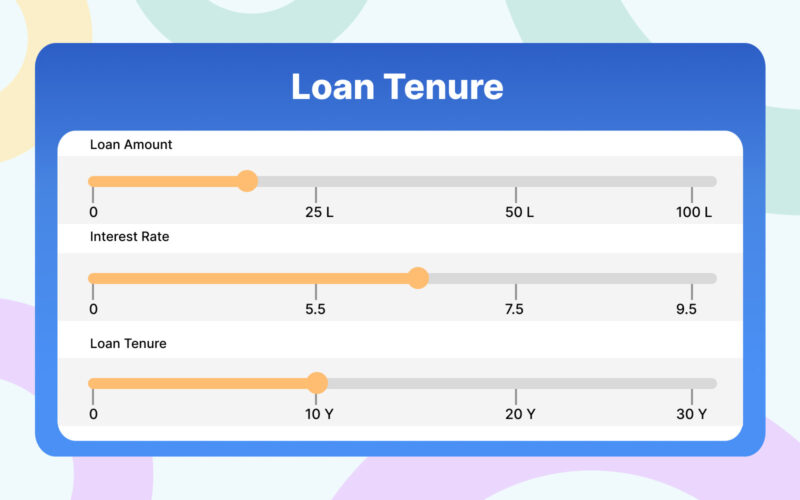Personal loans are gaining popularity in India as a reliable solution to finance unexpected expenses or major purchases. These loans are versatile, catering to various needs such as medical emergencies, wedding celebrations, debt consolidation and home improvements. Notably, personal loans do not require collateral, making them accessible to a broader range of borrowers. Furthermore, the digital age has introduced online platforms offering paperless processes and flexible options for EMIs and loan tenures.
With personal loans covering a wide range of expenses, the loan tenure significantly impacts the loan amount and monthly payments. It is crucial to grasp the available tenure options to make informed decisions when applying for a personal loan.
In this article, we will explore the maximum and minimum tenure options for personal loans in India while highlighting essential factors to consider when selecting the most suitable loan tenure.
What are Personal Loans?
A personal loan is an unsecured loan provided by banks and financial institutions to individuals for various personal purposes. These loans do not require collateral, meaning you don’t have to put up any assets as security. They are typically repaid in monthly instalments over a fixed period. The interest rate on a personal loan depends on your credit score and the lender, so it’s essential to compare rates before applying. Understanding the terms and conditions such as interest rate, repayment period, and any applicable fees on your personal loan is crucial.
Below are the main features of personal loans:
- Unsecured: No need to put up assets as security.
- Flexible: Funds can be used for any legitimate personal purpose.
- Convenient: The approval process is usually quick.
- Repayment in EMIs: You’ll repay the loan in fixed monthly instalments.
What is the Loan Tenure for Personal Loans?
The loan tenure is the amount of time you have to repay a personal loan. It’s important to consider your financial situation while choosing a loan tenure, as it will affect your monthly payments. A longer tenure means lower EMIs and more time to repay, while a shorter tenure avoids extended financial liabilities. Understanding the personal loan maximum and minimum tenure is crucial before applying for a personal loan to choose the most suitable repayment period.
Personal loan maximum tenure
While considering a personal loan, you’ll find that the maximum tenure typically ranges from 1 year to 5 years, depending on the lender’s policies and your credit score. If you’re borrowing a substantial amount, opting for a longer tenure, like 3 to 5 years, can be beneficial, ensuring you have manageable monthly payments and can repay the loan on time. Keep in mind that longer tenures may result in higher overall interest payments over time.
It’s important to strike a balance and choose a comfortable loan tenure that allows you to make affordable monthly payments without excessive interest outflows. Responsible repayment behaviour can also have a positive impact on your credit score.
Personal loan minimum tenure
The minimum tenure for a personal loan usually ranges from 10 to 12 months, with some lenders even offering a 3-month option. Just like the maximum loan tenure, the minimum loan tenure also varies among lenders. Before opting for a shorter loan tenure, it’s essential to calculate your financial commitments.
Shorter tenures are suitable for smaller loan amounts and higher monthly incomes that can comfortably accommodate the EMI amount. They allow borrowers to repay the loan quickly, avoiding long-term debt burdens. Keep in mind that personal loans with short tenures often come with higher interest rates.
Personal loan maximum tenure vs personal loan minimum tenure
| Loan Tenure | Maximum Loan Tenure | Minimum Loan Tenure |
|---|---|---|
| Time Period | Typically, 1 to 5 years | Typically, 10 to 12 months |
| Impact on EMIs | Lower monthly EMIs but higher interest costs over time | This may result in higher EMIs |
| Borrower’s benefit | Beneficial for those borrowing a substantial amount with manageable monthly payments and timely repayment | Beneficial for those borrowing a small amount and preferring quick loan repayment |
| Financial suitability | Generally suitable for individuals with lower monthly incomes | Generally suitable for individuals with higher monthly incomes |
| Interest rates | This can result in higher interest costs over time | May come with higher interest rates |
Factors That Affect Loan Tenure Selection
When selecting the right loan tenure for your personal loan, consider these factors:
- Monthly income: Your income determines whether you can opt for a shorter tenure with lower EMIs or need a longer tenure with higher EMIs.
- Existing debts: Factor in other debts you have, so you don’t take on more than you can repay.
- Interest rate: The interest rate affects the overall interest you’ll pay; longer tenures mean more interest.
- Financial goals: Choose a shorter tenure for quick repayment or longer tenure for long-term savings.
- Purpose of the loan: Short-term needs suit shorter tenures, while long-term goals fit longer tenures.
- Age and credit score: Younger borrowers may get longer tenures and a good credit score can secure a lower interest rate.
Read More: What are the Factors That Affect Personal Loan Tenure?
Which Loan Tenure is Right for You?
Selecting the right loan tenure for your personal loan is a crucial decision that requires careful consideration. It depends on your financial situation, loan amount, and repayment capability. If you have a higher income and can manage higher EMIs, a shorter tenure may be suitable as it minimises interest costs and ensures quick loan repayment. On the other hand, if you need more time for repayment and have a smaller loan amount, a longer tenure with lower EMIs might be ideal.
Conclusion:
Carefully assess your financial goals and existing commitments before making a decision. Remember, choosing the right tenure will help you manage your personal loan effectively and achieve your financial objectives.








